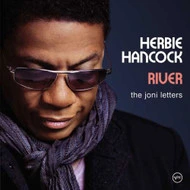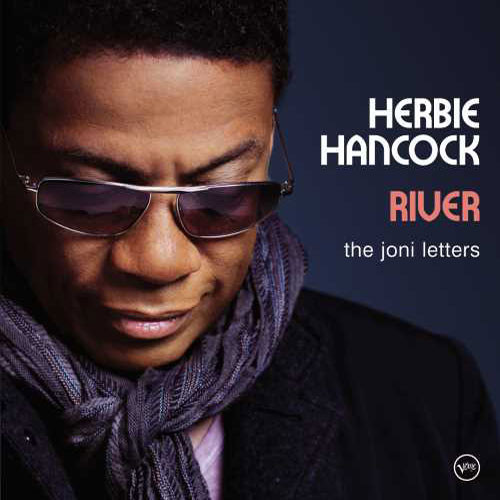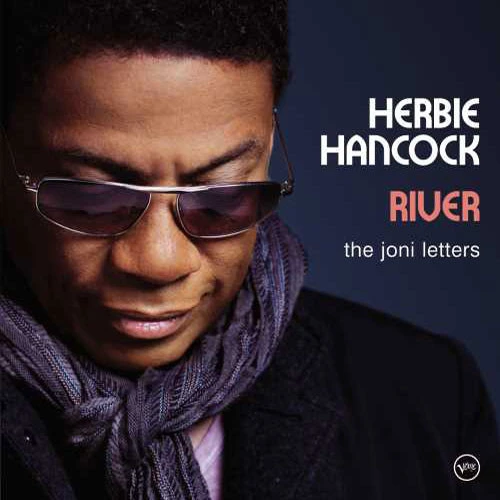2008 Grammy Award Winner for:
'Album of the Year'
'Best Contemporary Jazz Album'
The legendary pianist and innovator explores the words and music of another musical pioneer Joni Mitchell on his first new studio recording for Verve since 1998's GRAMMY® Award winner Gershwin's World. Inspired in equal parts by Mitchell's poetic lyrics and unique melodies/harmonies, the musicians play with a restraint and elegance that achieves a perfect balance between the adventurous aesthetics of jazz improvisation and the emotional directness of one of the finest singer/songwriters of the last five decades.
Joni Mitchell and Herbie Hancock, along with Miles Davis, Wayne Shorter, Pablo Picasso, and other great artists of our time, share an incessant and profound creative restlessness. They each have always had the desire and need to break fresh ground with each note played or stroke of the brush. It was exactly this kind of curiosity which motivated Davis to hire Hancock in 1963 to be a part of, along with Wayne Shorter, Ron Carter, and Tony Williams, arguably one of the most important groups of musicians of the twentieth century. It was in fact Miles who told Hancock to never finish anything. Hancock, like Joni Mitchell, has gone on to explore many different genres and mediums to express his incessant curiosity, working in the context of jazz, electronic music, funk, orchestral, and film music.
Hancock first worked with Joni Mitchell on the iconic singer/songwriters Mingus record, an album comprised of collaborations between Mitchell and the great bassist and composer Charles Mingus. Together with Wayne Shorter, Hancock was part of a small group with which Mitchell tried to craft a new conversational approach to coupling lyrics with instrumental jazz.
At this point in my career, Hancock says, I want to do something that reaches into the lives and hearts of people. For River, Hancock enlisted producer/ arranger/ bassist Larry Klein (Mitchells long-time producer and creative partner, who has also produced albums by Madeleine Peyroux and Shawn Colvin among many others), to help him go deeply into Mitchells body of work to select songs that Hancock and Klein could adapt to a genre-less and conversational musical approach, while trying to portray the breadth of Mitchells gift as a musician and writer. To add another dimension to their picture of Mitchells musical world, they also included two compositions that were important to her musical development, Wayne Shorters asymmetrical masterpiece Nefertiti, first recorded by Hancock and Shorter on Miles Davis classic album of the same name, and Duke Ellingtons prescient standard Solitude.
Hancock and Klein worked for months, carefully reading through Jonis lyrics and music, eventually paring their list down to thirteen songs that they hoped comprised a panoramic view of the poets work. They went on to craft arrangements for songs like the often recorded Both Sides Now, and Sweet Bird (from Mitchells overlooked classic The Hissing of Summer Lawns) that transformed the songs into lyrical and elegant instrumental tone poems, devoid of the trappings of conventional jazz records.
River: The Joni Letters represents a journey into a new world in Hancocks search for fresh ground. A world of words.
Musicians:
Herbie Hancock, piano
Wayne Shorter, soprano & tenor saxophone
Dave Holland, bass
Vinnie Colaiuta, drums
Lionel Loueke, guitar
Norah Jones, vocals (1)
Tina Turner (2)
Corinne Bailey Rae (4)
Joni Mitchell (6)
Luciana Souza (8)
Leonard Cohen (10)
Selections:
1. Court and Spark - featuring Norah Jones
2. Edith and the Kingpin - featuring Tina Turner
3. Both Sides Now
4. River - featuring Corinne Bailey Rae
5. Sweet Bird
6. Tea Leaf Prophecy - featuring Joni Mitchell
7. Solitude
8. Amelia - featuring Luciana Souza
9. Nefertiti
10. The Jungle Line - featuring Leonard Cohen
'Album of the Year'
'Best Contemporary Jazz Album'
The legendary pianist and innovator explores the words and music of another musical pioneer Joni Mitchell on his first new studio recording for Verve since 1998's GRAMMY® Award winner Gershwin's World. Inspired in equal parts by Mitchell's poetic lyrics and unique melodies/harmonies, the musicians play with a restraint and elegance that achieves a perfect balance between the adventurous aesthetics of jazz improvisation and the emotional directness of one of the finest singer/songwriters of the last five decades.
Joni Mitchell and Herbie Hancock, along with Miles Davis, Wayne Shorter, Pablo Picasso, and other great artists of our time, share an incessant and profound creative restlessness. They each have always had the desire and need to break fresh ground with each note played or stroke of the brush. It was exactly this kind of curiosity which motivated Davis to hire Hancock in 1963 to be a part of, along with Wayne Shorter, Ron Carter, and Tony Williams, arguably one of the most important groups of musicians of the twentieth century. It was in fact Miles who told Hancock to never finish anything. Hancock, like Joni Mitchell, has gone on to explore many different genres and mediums to express his incessant curiosity, working in the context of jazz, electronic music, funk, orchestral, and film music.
Hancock first worked with Joni Mitchell on the iconic singer/songwriters Mingus record, an album comprised of collaborations between Mitchell and the great bassist and composer Charles Mingus. Together with Wayne Shorter, Hancock was part of a small group with which Mitchell tried to craft a new conversational approach to coupling lyrics with instrumental jazz.
At this point in my career, Hancock says, I want to do something that reaches into the lives and hearts of people. For River, Hancock enlisted producer/ arranger/ bassist Larry Klein (Mitchells long-time producer and creative partner, who has also produced albums by Madeleine Peyroux and Shawn Colvin among many others), to help him go deeply into Mitchells body of work to select songs that Hancock and Klein could adapt to a genre-less and conversational musical approach, while trying to portray the breadth of Mitchells gift as a musician and writer. To add another dimension to their picture of Mitchells musical world, they also included two compositions that were important to her musical development, Wayne Shorters asymmetrical masterpiece Nefertiti, first recorded by Hancock and Shorter on Miles Davis classic album of the same name, and Duke Ellingtons prescient standard Solitude.
Hancock and Klein worked for months, carefully reading through Jonis lyrics and music, eventually paring their list down to thirteen songs that they hoped comprised a panoramic view of the poets work. They went on to craft arrangements for songs like the often recorded Both Sides Now, and Sweet Bird (from Mitchells overlooked classic The Hissing of Summer Lawns) that transformed the songs into lyrical and elegant instrumental tone poems, devoid of the trappings of conventional jazz records.
River: The Joni Letters represents a journey into a new world in Hancocks search for fresh ground. A world of words.
Musicians:
Herbie Hancock, piano
Wayne Shorter, soprano & tenor saxophone
Dave Holland, bass
Vinnie Colaiuta, drums
Lionel Loueke, guitar
Norah Jones, vocals (1)
Tina Turner (2)
Corinne Bailey Rae (4)
Joni Mitchell (6)
Luciana Souza (8)
Leonard Cohen (10)
Selections:
1. Court and Spark - featuring Norah Jones
2. Edith and the Kingpin - featuring Tina Turner
3. Both Sides Now
4. River - featuring Corinne Bailey Rae
5. Sweet Bird
6. Tea Leaf Prophecy - featuring Joni Mitchell
7. Solitude
8. Amelia - featuring Luciana Souza
9. Nefertiti
10. The Jungle Line - featuring Leonard Cohen




 Turntable Accessories
Turntable Accessories Headphone Accessories
Headphone Accessories Cable Accessories
Cable Accessories Vinyl Accessories
Vinyl Accessories Compact Disc Accessories
Compact Disc Accessories







